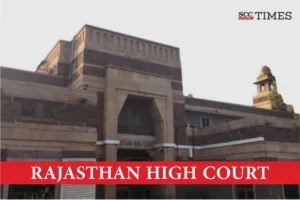Rajasthan High Court: In a writ petition challenging the Central Administrative Tribunal’s (CAT) order dismissing petitioners’ application against the State Government’s decision to allocate vacancies in the Indian Administrative Service (IAS) to Non-State Civil Services (Non-SCS) officers, a Division bench of Pankaj Bhandari* and Shubha Mehta, JJ., dismissed the petition as devoid of merit and filed with ulterior motives and directed the petitioners to pay costs of ₹5 lakh to the Rajasthan State Legal Services Authority within four weeks.
Brief Facts
In the instant matter, the petitioners are members of the Rajasthan Administrative Service (RAS). They challenged the State Government’s allocation of vacancies in the IAS for the Non-State Civil Service (non-SCS) officers, alleging misinterpretation and arbitrary application of the IAS Recruitment Rules, 1954.
Petitioners’ Contentions
The petitioners contended that Rule 8(2) and Rule 4(1)(c) of the IAS Recruitment Rules, 1954, were being treated as a reserved quota for non-SCS officers without meeting the “special circumstances” condition. It was contended that the vacancies for non-SCS officers exceeded permissible limits (15% of 33.5% of total vacancies for promotions under Rule 8). It was stated that the equivalent of 9 years’ service for non-SCS officers with the rank of Deputy Collector was incorrect. It was further contended that absence of defined criteria for non-SCS selection disadvantaged RAS officers.
Respondents’ Contentions
However, the State contended that the petitioners lacked legal standing as mere promotion chances are not legal and enforceable rights. It was contended that the recruitment complied with the IAS (Recruitment) Rules, 1954 and IAS (Appointment by Selection) Regulations, 1997. The State justified the selection decisions under “special circumstances” and contended that they were based on merit and specific needs of the State Government. It was contended that the rules capped non-SCS recruitment at 15% of 33.5% of total senior posts, was adhered to.
Moot Point
-
Whether the State Government violated recruitment rules by reserving vacancies for non-SCS officers without fulfilling “special circumstances” requirements?
-
Whether the determination of vacancies for non-SCS officers exceeded statutory limits?
Relevant Rules and Regulations
-
All India Services Act, 1951 — empowers the Central Government to frame recruitment and service conditions for IAS in consultation with State Governments.
-
IAS (Recruitment) Rules, 1954:
-
Rule 4 — prescribes recruitment methods competitive examination, promotion (State Civil Service), and selection (non-SCS).
-
Rule 9 — caps non-SCS appointments to 15% of the 33.5% total IAS appointments through State services.
-
-
IAS (Appointment by Selection) Regulations, 1997 — specifies the process for determining non-SCS vacancies and preparing selection lists.
-
IAS (Appointment by Promotion) Regulations, 1955 — governs promotion from State Civil Services.
Court’s Analysis
The Court referred to P.M. Bayas v. Union of India, 1993 (3) SCC 319, where the Supreme Court held that “as per the scheme of the Rule and Regulations, it is the State Government which has to be satisfied regarding the existence of “special circumstances”. Therefore, the question whether “special circumstances” exists and whether the non-SCS category candidates are meritorious is to be seen by the State Government and the Central Government and not by the Courts.”
The Court noted that the IAS (Recruitment) Rules, 1954, explicitly allows appointments from both SCS and Non-SCS categories, and the petitioners did not challenge the validity of these rules. The Court stated that the total recruitment from SCS and non-SCS categories cannot exceed 33.5% of senior State posts, with non-SCS capped at 15% within this quota. The Court found no breach of the 15% cap for non-SCS appointments within the overall 33.5% limit for State services. The Court stated that the use of the term “quota” was clarified as non-consequential since vacancy allocation is based on detailed consultations and approvals.
The Court confirmed that “special circumstances” and merit were considered by State and Central Governments. The Court stated that the records showed that non-SCS officers were selected based on merit and compliance with statutory requirements.
The Court upheld that vacancies for SCS and Non-SCS appointments are determined annually by the Central Government in consultation with State Governments and the Union Public Service Commission (UPSC), adhering to caps prescribed in Rule 9 of the IAS (Recruitment) Rules, 1954.
The Court criticized the petitioners for attempting to block non-SCS recruitment and labelled it an act of greed. The Court viewed the writ as an attempt to monopolize posts for SCS officers, undermining fair recruitment practices. The Court noted that delaying the recruitment process could disqualify meritorious non-SCS candidates due to age constraints or procedural expiration (December 31 deadline) and emphasised on the timely completion of the selection process to avoid disqualification due to age or administrative deadlines.
Court’s Decision
The Court dismissed the present writ petition as devoid of merit and filed with ulterior motives. The Court directed the petitioners to pay costs of ₹5 lakh to the Rajasthan State Legal Services Authority within four weeks.
[Rajasthan Prashasanik Sewa Parishad v. Union of India, 2024 SCC OnLine Raj 3422, Decided on 05-12-2024]
*Judgment by Justice Pankaj Bhandari
Advocates who appeared in this case :
Mr. R.N. Mathur, Sr. Advocate assisted by Mr. Tanveer Ahamad, Mr. Prithvi Pal, Mr. Nitish Joshi, Mr. Zaid Ul Haq, Mr. Gholam Noorani, Counsel for the Petitioners
Mr. A.K. Sharma, Sr. Advocate assisted by Mr. Banwari Lal Sharma, Mr. Namo Narayan Sharma, Mr. Madhav Dadhich, Mr. Rachit Sharma; Mr. Vigyan Shah, AAG with Mr. Sankalp Vijay, Mr. Naman Mishra, Mr. Shubendra Singh, Mr. Yash Joshi; Mr. Anand Sharma with Mr. Alam Sahni and Mr. Amit Mathur, Counsel for the Respondents

